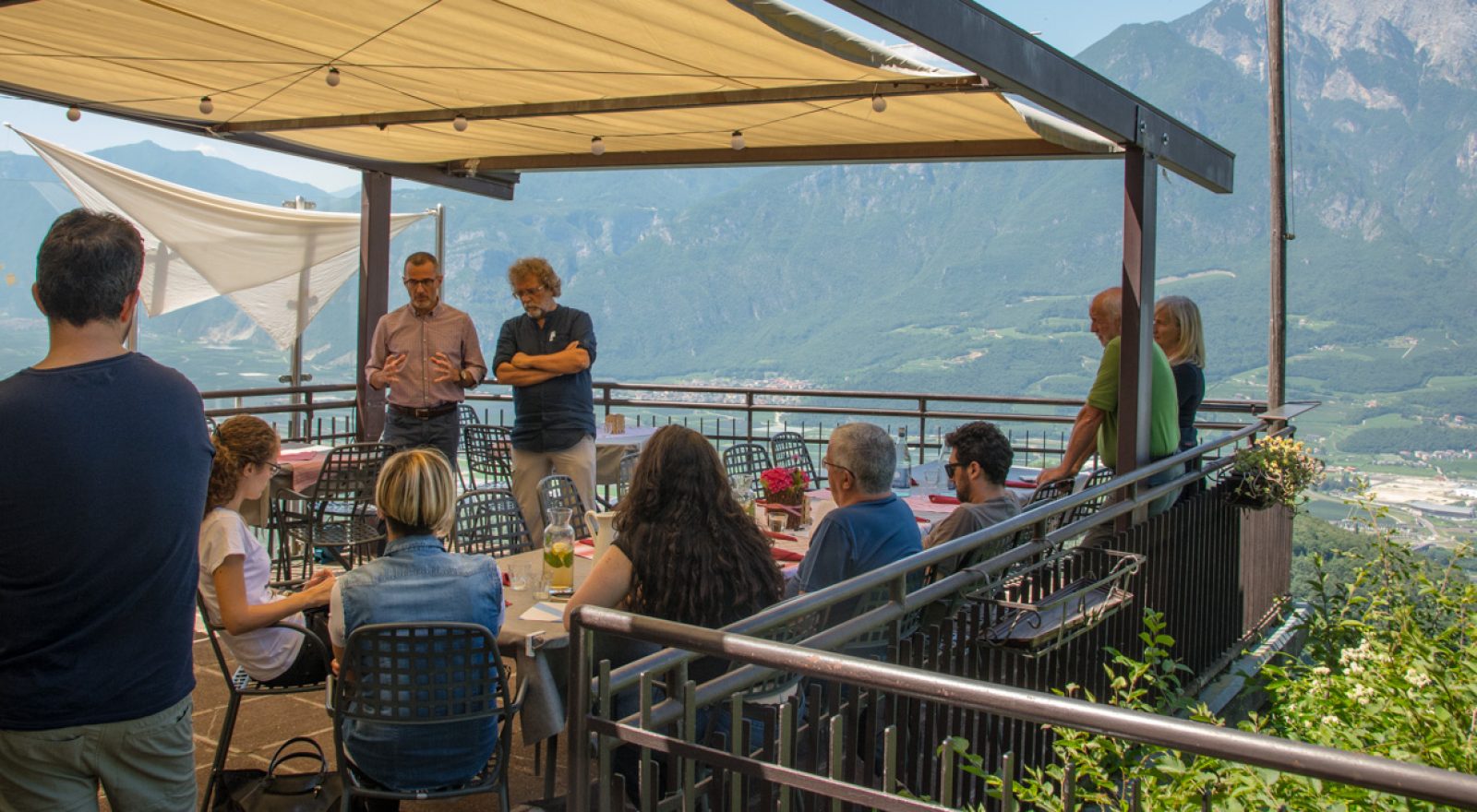SenSAT – Fire Sensors Designed by Students in the Trentino Mountain Lodges
The project coordinated by Fondazione Bruno Kessler was presented at the Bindesi - "P. Prati" mountain lodge this morning
The SenSAT project, coordinated by Trento based Fondazione Bruno Kessler was presented this morning at the Bindesi – “P. Prati ” mountain lodge. The project will start in the next school year and will involve more than 200 students from the Trentino schools with the objective of achieving a sensor to monitor air quality in mountain lodges.
Some background
Trentino is an ideal place from which to start to see with one’s own eyes the positive results that can be achieved through a serious and structured “Alternating school and work” program for high school students.
Last year, Fondazione Bruno Kessler launched the DomoSens project, which, at the beginning of June 2017, engaged the students of many local schools in an ambitious goal: to make an innovation experience by developing a detector for air quality monitoring for homes, with a professional design that could also make it a decorative item. The program involved during school year 2016-17, in a process that simulated industry production, a community of nearly 180 high school students from Trentino, who actively participated in all the operational phases, supported by their teachers and by the FBK working group.
The SenSAT project
From the recently concluded experience, backed by the enthusiasm shown by those who participated in it and the interest of the educational institutions involved, we realized that we had developed, rather than a single project, an innovative model for the “Alternating school and work” program. This opens up to important scenarios since, as a model, it can be replicated as a module or adapted to other situations.
To test this next year, FBK proposes SenSAT: an application that further develops and applies the work done with DomoSens for use in SAT mountain lodges. Objective: to monitor the air quality in the lodge, in order to contribute to the hospitality offered, and to be an additional tool as far as facility safety is concerned, allowing for detection of possible fire events in their initial stages. The project envisages the creation of a control room that will handle all the information gathered by the sensors and will implement the necessary alert procedures, involving also public response teams.
The kids involved (around 200, all under 19, from 7 high schools, mainly in their fourth year) must first conduct a historical and geographical analysis of the existing lodges in Trentino, carry out an assessment of their socio-economic role, adapt the design of the Domosens product to the specific requirements of the new setting and prepare the paste sensitive to the gas to be monitored (mainly CO). It will also be crucial to provide mechanisms for transferring data from sensors onto a cloud platform to make them easily accessible and in particular to supervise them through one or perhaps more centralized control stations. The project includes a cost analysis to define a price list based on the number of sensors installed and their maintenance over time, so that the educational exercise provides for these possibilities as well. In this regard, it is intended, with the support of the Federazione Trentina di Cooperazione, to train a group of participants that will start a school cooperative in charge of managing the local network of the installed sensors in the years to come.
“The possibility exists that from this experience,” Pierluigi Bellutti, scientific director for FBK, “together with that of DomoSens, an innovative, start-up or cooperative entrepreneurial entity can emerge, as well as an innovative “Alterating school and work” program model that is replicable and transferable elsewhere. At the moment, DomoSens has raised the interest of national representations such as the National Forensic Council and the Industrial Design Association that will agree with FBK to include modules pertaining to the area of expertise: a first step to transfer the model outside the Trentino area. ”
“The challenge we intend to meet together with FBK and the other project partners is an interesting one,” SAT President Claudio Bassetti says, “mainly because it focuses the work on research, training the students in a practice that in the future could open up their study and work horizons. Secondly, it should be emphasized that the project is very down-to-earth, simulating the activity of a real start up, both in terms of working method and the establishing of the entity that will be in charge of organizing and managing this process. For SAT, this is definitely the beginning of a very profitable collaboration phase, at the center of which the lodge is the site for experimentation. A not at all trivial fact, if we consider that mountain lodges are not generic buildings, but structures in which work is always carried out under extreme conditions. We are therefore not only convinced, but also enthusiastically involved in this highly scientific experiment. ”
The SenSat project brings with it several positive and strategic elements. In particular:
• It allows students to make an active experience, as protagonists, of the “Atlernating school and work” program with the implementation of the basics acquired so far in a model that simulates with good approximation an innovative business initiative (take the results of state-of-the-art research, make it a product, and place it in a strategic market plan). Through the establishment of the school cooperative (whose components will inevitably change over the years following the school cycles) they will work to maintain in the future the results of their work.
• For schools, it is an opportunity to bring training closer to the research world by shortening the distance between their reality and the one where the boys and girls will be in when they enter the workplace. For teachers it may be an update opportunity or at least a stimulating chance to find new ideas to propose to their classes.
• The beneficiary, as a partner of the local economy, in this case SAT, a volunteer based association, is given the opportunity to derive a double benefit: to have in the future a useful tool for the safety of its structures and at the same time an opportunity to bring the millenials closer to mountain lodges that many of them are not familiar with, which, if well-presented on the spot, could in itself be an element of visibility.
• the Trentino area is given the opportunity to become a great laboratory for smart solutions (smart area). Once the network has been set up with the first sensors (which could be extended over time) this can become the basis for several studies concerning “internet of things” (IoT) applications, whose first possible goal could be large-scale environmental monitoring, and the environment is actually one of S3s (regional smart specializations) declared by Trentino in Europe.
• FBK, as a proponent, in addition to offering innovative “Alternating school and work” program solutions as a strategic impact on the local area can access, for its research and collaborations, for demonstrations that complement the research of its two science and technology centers, to an Internationally renowned local laboratory.
In addition to FBK, project promoter, the following partners will cooperate: SAT-Società degli Alpinisti Tridentini, ITT Buonarroti-Pozzo – Trento, Curie Science Lyceum – Pergine, Arts High Schools Depero – Rovereto and Vittoria – Trento, ITT Marconi – Rovereto, High School Prati – Trento, ITE Tambosi-Battisti – Trento.
Other organizations, which will be involved in training, with specific interventions, will include: Trentino Sviluppo (business plan), HIT-Hub Innovazione Trentino (Intellectual Property Enhancement), University of Ferrara – Physics Department (for chemistry and physics of gas sensors) Federazione Trentina di Cooperaziones (school cooperative for the management of the installed network), National Forensic Council (for legal aspects of innovation: contracts, agreements, protection of ideas), ADI – Association for Industrial Design (the role of design in innovation).
The project will be supported by a contribution from the Caritro Foundation.

